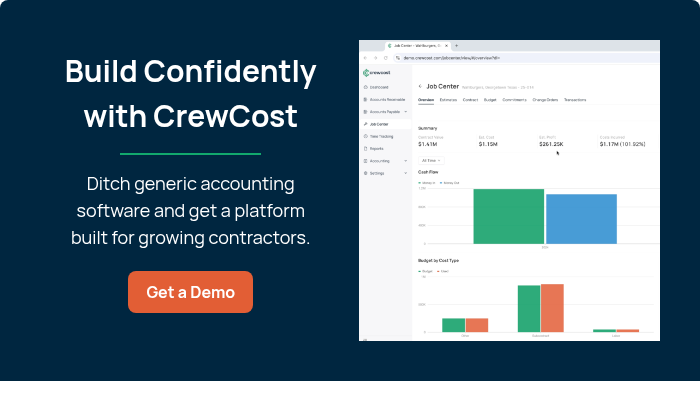If any construction contract embodied the ‘dangling carrot’ idiom, it’d be incentive contracts. And while it may seem crude to picture yourself as a rabbit on a wheel, this type of contract offers plenty of benefits if you’re able to work fast.
Still unsure if incentive construction contracts are a good fit for your business? Keep reading to learn their specifications, benefits, and disadvantages.
Key Takeaways
- Incentive based construction contracts encourage you to work faster or meet certain goals to reap financial incentives as negotiated with the owner.
- These types of contracts usually favor the contractor and offer a supplemental allotment of money to profit from.
- With more incentives to meet certain specifications, you will have more ownership and control of the work.
What is an Incentive Construction Contract?
Under an incentive construction contract, the owner will offer rewards and incentives as extra motivation to hit specific project milestones. These incentives are tied to specific goals, such as completing a job on time, not going over budget, or achieving a certain level of quality. These terms will be set by the owner within the contract, and obligate them to pay additional compensation if the targets set are met.
For better or worse, there is no standard formula for incentive based contracts, and each one is unique to its project. Ultimately, the purpose of this type of contract is to provide motivation to deliver a better product through attainable targets and appropriate incentives.
Five Types of Incentive Construction Contracts
Below is a quick overview of the most common types of incentive contracts you’ll encounter.
Fixed-price incentive contracts: Under this type of contract, you agree to perform the work at a certain price. If, during the course of the project you either a) find cost savings from approved VE opportunities b) work is done quicker than expected or c) allowances not used, you will receive a higher profit and put that excess money directly in your pocket.
Cost reimbursement contracts: Because you’ll be paying for the job upfront and have to wait for the owner to reimburse you, this contract comes with a bit more risk. As the total value of the project is not known beforehand, the owner will agree to pay the whole cost and will usually reward you with a bonus once the project is completed. Sometimes, these contracts take the form of a Guaranteed Maximum Price (GMP) so the owner has a rough idea of pricing before the project begins.
Performance incentive contracts: These contracts reward (or penalize) you based on the quality of the work and other standards. Instead of a fixed cost for the work, the owner will include incentives throughout the project if you achieve certain milestones or display good craftsmanship.
Schedule incentive contracts: Schedule is the big incentive here. If you achieve mutually-agreed-upon milestones, then you will be rewarded. If you fail to meet them, you’ll face a penalty.
Multiple incentive contracts: Some owners decide to combine a few incentives together under one contract. For example, they may reward you for both meeting a schedule and delivering a high quality final product.
Pros & Cons of Incentive Contracts
As with any contract type, there are several advantages and disadvantages to be aware of before submitting a proposal.
Pros
- You have the potential to achieve a higher profit by meeting certain milestones and goals throughout the project.
- Oftentimes the extra financial motivation will result in greater discipline/workmanship from the trades.
- Incentive construction contracts discourage inefficiency and waste, while encouraging optimizing your processes to meet targets.
Cons
- These contracts come with higher administrative costs that must be accounted for to ensure quality and adherence to schedule and budget.
- Negotiations for incentives can be challenging. In the beginning of the contract, expect to navigate some clashes on what constitutes an honest incentive and the monetary value of such.
Benefits of Taking on Incentive Contracts
As a contractor, there is always a use for incentive contracts, especially if you think you’ll be able to beat your schedule or cost. Additionally, if your business has some extra financial padding, it can be worth petitioning the owner to add specific incentives to the contract.
Still, it’s important to remember that this is a delicate ask. When approached carelessly, the owner may think you’re taking advantage of them and ask for the Fixed Price or GMP to be lowered when asked for an incentive. For example, if a project costs $5m and you ask for an additional $500k in incentives throughout the contract, the owner may ask to lower the project to $4.5m. If you think about it from their perspective, it makes sense. In their mind, any incentives should be included in the project cost and beyond that, you shouldn’t need additional incentives to do a good job. That’s why it’s essential to know the cost of the project and your profit before going into any negotiations.
When it comes to profit, incentive construction contracts can offer your business a sizable boost. Simply meet the goals outlined in the contract and enjoy the extra cash. Plus, these additional funds are allocated before the project begins, allowing you to access more funds while the work is being performed.
While incentive construction contracts take a little more finesse in communication and negotiation upfront, they can be a lucrative option for any business willing to over deliver on speed, safety, and quality.
Further Reading: A Guide to the 8 Types of Construction Contracts
Jarone started his construction career working for a commercial general contractor in Los Angeles, before transitioning to being an Owner's Representative for the past eight years. Jarone has led multiple projects and has been integral in cross-departmental communication and implementation of processes with design, leasing, planning and facilities/operations teams.

